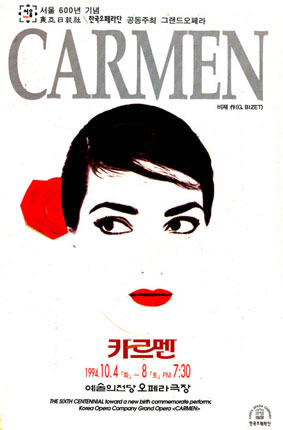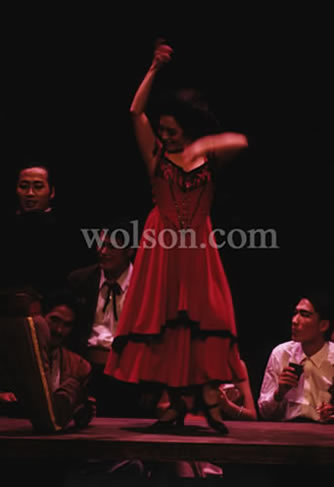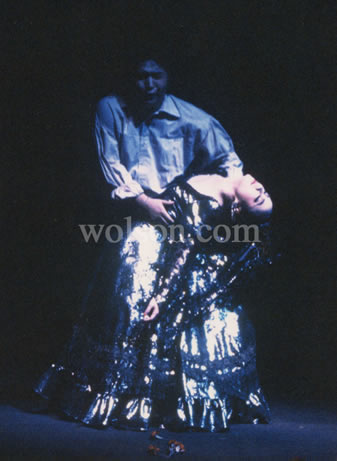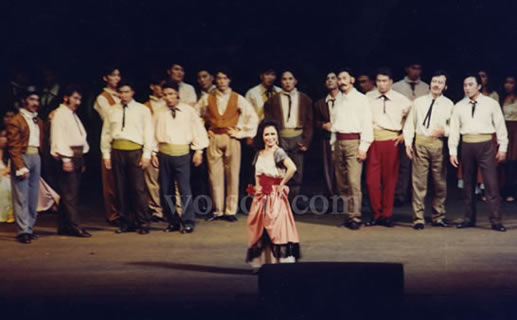객석 |
비극과 희국 역할 자유릅게 넘나들며
오페라
무대 데뷔 |
女性中央(中央日報) |
재일교포
성악가 전월선 나의 순수한 예술혼에는 국적이 없습니다 |
月刊音樂 |
나의 삶 나의 음악 전월선 |
月刊queen |
나의음악
나의조국 일본 오페라계의 새별,유일한 재일동포 프리마돈나 전월선 |
東亞日報 |
日오페라계
프리마돈나 - 田月仙 "고국무대
첫선 자랑스러워요" |
日刊스포츠 |
세계로 진출하고파요,,소프라노전월선씨 <카르멘>주역.고국무대첫선 |
한국일보 |
(카르멘)주역 맡아 來韓
소프라노田月仙씨 在日한국계. 다양한 활동위해 국적 취득 |
스포츠조선 |
고국무대
가슴설레요,,오페라 [카르멘]주역.재일교포 2세 소프라노 전월선씨 |
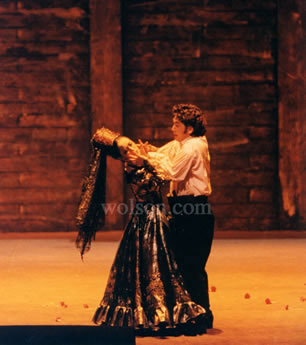 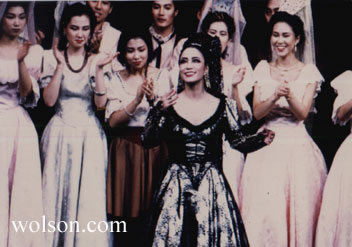
Opera Singer with an International Tone Daily
Yomiuri
It's a drama that I can best perform by singing,"
Chon Wol Son says, referring to the art of opera singing. Chon, a South Korean resident in
Tokyo, a performer who exudes confidence and lives to be the perfect performer. "No
matter how beautiful the voice, one cannot communicate emotions such as grief, joy and
jealousy to the audience if one does not become a part of the drama," Chon says.
"I believe I do that." Her recent recital in Tokyo testified to that
self-confidence. The show, commorating the 50th anniversary of the end of World War II,
consisted of two parts. The first half was devoted to Korean, Spanish and other songs,
while the second half featured Chon, singing the most climactic pieces of Bizet's
"Carmen," a tragic love story of a Spanish gypsy and a corporal. Few opera
singers can (or bother to) dance during their performances. Chon, however, dances if that
is what the role calls for. In "Carmen," she performed the flamenco during a
fight scene between two groups of female tobacco workers.
The spectacular performance was indeed unusual, considering
the scene is usually performed by chorus members while Carmen sings. Chon learned the
fiamenco when preparing for a concert in Seoul in October 1994. "By incorporating
dances into my performance, it's easier for me to show the audience what I have." Chon's childhood was a foretelling of, or a prelude to, her present career. While
attending Korean schools in Tokyo, she was enthralled with most performing arts and
excelled at whatever she took on. She often performed Korean dances and songs, in addition
to playing the piano and reciting poetry, for special events nized by Korean residents.
Thus, it was hardly surprising that she entered a highly competitive junior college
affiliated with Toho Gakuen School of Music in Tokyo after graduating from high school.
Though Chon first focused on playing the piano, she switched to singing at the suggestion
of one of her teachers who said she was better suited to that considering her high singing
scores. While watching an opera one day, the pieces of Chon's future began to fall into
place as she realized that opera contained all the elements of performing arts that she
enjoyed -- dramatic stage sets, elements of theater, dancing, singing and orchestration.
From that time, she knew opera would best allow her to utilize her diverse talents After
finishing college, Chon continued her operatic studies at the Niki-kai, the nation's
leading association of opera artists.
In 1983, she made her professional debut, giving a series of recitals in
Tokyo. While Chon was born and raised in Tokyo, she refers to Japan as her
"furusato," hometown, and considers North and South Korea her
"sokoku," homeland. Unlike many South and North Koreans born in Japan, she never
adopted a Japanese name. "That's only natural to me," she says, "because
I've never considered myself a Japanese." Chon was registered as a North Korean by
origin, even though her parents were from Kyongsangnamdo, a southern part of South Korea
Shortly before her 1994 concert in Seoul, Chon said she changed her nationality from North
Korean to South Korean because that was more convenient. She had once hoped to study opera
in Italy but was unable to because she couldn't get a passport. In those days, North
Koreans were not allowed to enter Italy, she says. While Chon says there was nothing
unusual about her changing her nationality, some of her friends and acquaintances felt
otherwise. "North Koreans in lapan were not pleased, while some South Koreans looked
at me as though I were a convert," Chon says. Chon said three concerts will forever
burn in her memory: one in Pyongyang, one in Seoul and another in Tokyo. It was not until
April 1985 that Chon was able to visit her North Korean homeland for the first time to
perform in the World Music Festival in Pyongyang. "I was more than thrilled to sing
before a large audience in my own country. It was wonderful to think that I had come this
far as an opera singer," Chon says. "That was the best performance I've ever
given." Last October, Chon was invited to perform the lead role in "Carmen"
at the Opera House in Seoul, the largest of opera house in Asia. "As a South Korean
resident in Japan," she says, "I was so proud to sing before Koreans at the
Opera House. "I was overcome with deep emotions when I considered that I had
performed in both the South and North." Chon says her May recital in Tokyo was also
an emotional experience and one of her best recitals yet. "Many South and North
Koreans came to my performance," Chon says. Commenting on Japanese opera singers,
Chon says there are many who are excellent. Nonetheless, she feels there is something
essentially different between Japanese and European opera singers. Attending a concert in
Russia, Chon heard an array of opera singers from a number of countries. She said each
singer had a voice with its own distinct flavor and quality, reflecting their country of
origin. Chon's Taiwanese mentor has a voice on par with other top European singers. Even
so, Chon says she has an air of "being Asian" when she performs alongside
European singers. These observations made her feel there was a limit to the quality and
power of her voice. Compared to her Western contemporaries, Chon is small and has less
lung capacity. During her late 20s, Chon said it was extremely difficult cultivating a
voice not easily labeled as Asian. This meant she had to unlearn years of carefully
practiced techniques. In attempting to develop the quality of her voice, she said,
"It was as if I had to destroy something that had-been completed." At the age of
36, Chon says her vocalization is more international than many opera singers in Japan
today. But Chon says she's still in a transition period. "It takes both talent and
constant effort to become a successful singer, but effort counts more." Pushing
oneself is another type of talent, she says. This may be particularly true of foreign
residents in Japan. "Korean residents in Japan think they won'l make it here without
skills that outshine their Japanese competition," Chon says.
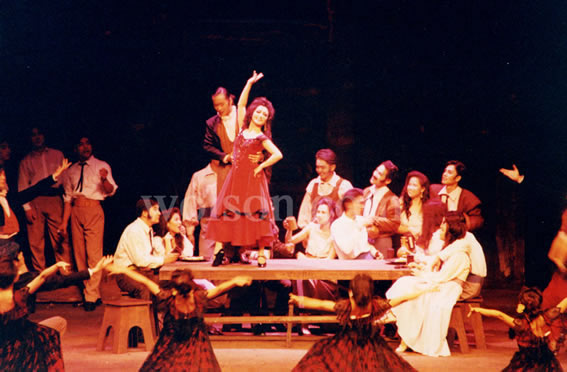
|
